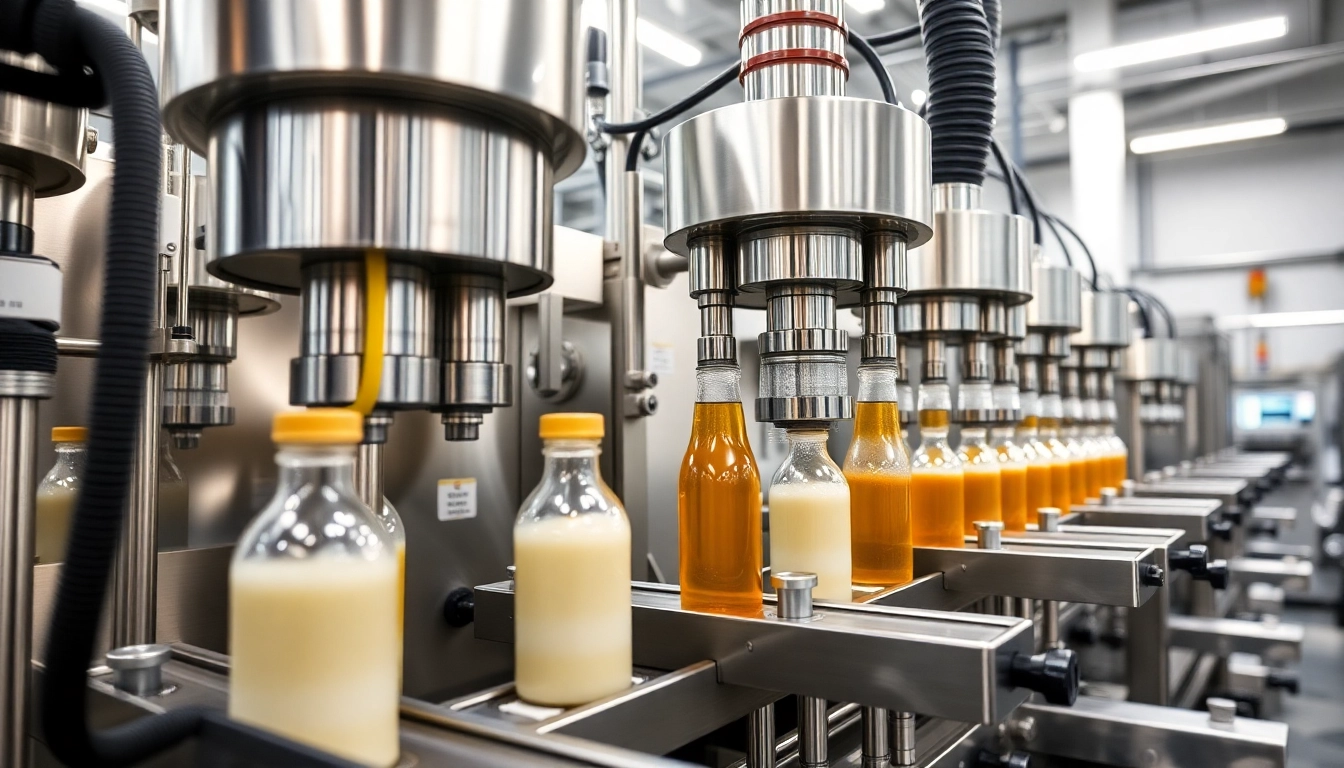Understanding Filling Machines
Filling machines play a crucial role in various industries by ensuring efficient and consistent filling of products into containers. These machines have evolved significantly over the years, becoming more automated and sophisticated, catering to the diverse needs of manufacturers worldwide. Filling Machine Manufacturers are at the forefront of this industry, developing solutions that enhance productivity, reduce waste, and maintain product integrity.
What Are Filling Machines?
Filling machines are specialized devices designed to dispense liquids, powders, or granulated products into containers of various sizes and shapes. These machines are critical components of production lines in sectors such as food and beverage, pharmaceuticals, cosmetics, and chemicals. The primary function of a filling machine is to ensure accurate and efficient filling while maintaining a high level of hygiene and product safety.
Types of Filling Machines
Filling machines can be categorized based on several factors, including the type of product they handle, their method of operation, and the level of automation. Some of the common types include:
- Volumetric Filling Machines: These machines fill containers based on a predetermined volume, which ensures accuracy and consistency.
- Piston Filling Machines: Suitable for thick or viscous products, piston fillers use a piston to draw in and expel the product.
- Gravity Filling Machines: These machines rely on gravity to fill containers, making them ideal for low-viscosity liquids.
- Auger Filling Machines: Used for powders, auger fillers measure out product using screw mechanisms.
- Overflow Filling Machines: Designed for high-speed operations, these machines fill to a certain level, then allow excess to overflow.
Applications Across Industries
Filling machines are employed in numerous industries, each requiring specific machinery tailored for various materials. For example:
- Food and Beverage: Filling machines are used to fill liquids, sauces, and dry products like sugar or flour.
- Pharmaceutical: They are essential for dispensing medicines, ointments, and syrups into precise dosages.
- Cosmetics: Filling machines help in packaging creams, lotions, and fragrances efficiently.
- Chemicals: Industrial chemicals often need careful handling; filling machines ensure safety and accuracy.
Key Features of Quality Filling Machines
Precision and Accuracy
One of the hallmarks of a high-quality filling machine is its ability to provide precise and accurate measurements. This is crucial to minimize product loss and ensure compliance with industry standards. Advanced filling machines feature automated calibration systems that help maintain this accuracy.
Speed and Efficiency Metrics
The efficiency of filling machines can be gauged by their speed, usually measured in containers filled per minute. High-speed machines can process thousands of containers in an hour, helping companies meet high demand while maintaining product quality.
Versatility in Liquids and Containers
Quality filling machines should handle various products and container types. Versatility allows manufacturers to adapt to market changes without investing in new equipment. Machines capable of switching between filling liquids, powders, and granules efficiently are invaluable.
Top Filling Machine Manufacturers
Industry Leaders and Their Innovations
Several manufacturers have established themselves as leaders in the filling machine industry, developing innovative solutions tailored for specific market needs. Some notable examples include:
- Accutek Packaging Equipment Company, Inc.: Known for a wide variety of filling machines, Accutek designs systems that integrate seamlessly into existing production lines, enhancing operational efficiency.
- Cozzoli Machine Company: Specializes in filling, capping, and washing machines, providing customized solutions for various applications.
- Volumetric Technologies: A prominent American manufacturer of bottle-filling machines, offering reliable and efficient solutions across industries.
- Oden Machinery: Focuses on manufacturing filling systems tailored to specific industry requirements, highlighting flexibility and customer-centric innovations.
- E-PAK Machinery: This company excels in providing complete bottling systems that include filling, capping, and labeling machines.
Comparative Analysis of Manufacturer Offerings
To choose the right filling machine, a comparative analysis of different manufacturers’ offerings can prove beneficial. Consider factors like:
- Types of products handled
- Automation levels available
- Customization options
- Customer support and service reliability
- Pricing and financing options
Case Studies of Successful Implementations
Real-world applications of filling machines offer insights into their efficiency and effectiveness:
For instance, a large beverage manufacturer was facing challenges with slow filling speeds and high waste levels. After implementing an advanced volumetric filling machine, they reported a 40% reduction in waste and a 25% increase in output, all while maintaining product quality.
Choosing the Right Filling Machine for Your Needs
Assessment of Production Requirements
Identifying specific production needs is critical when selecting a filling machine. Consider factors such as:
- The type of product being packaged (liquid, powder, viscous)
- The volume of production required (low, medium, high)
- The container types and sizes
Evaluating Manufacturer Support and Services
A reliable manufacturer should provide excellent support services, including installation, maintenance, and training. Look for companies that offer comprehensive service packages and have a reputation for responsive customer support.
Cost Considerations and ROI
Understanding the financial implications of investing in a new filling machine is essential for any business. Calculate the expected return on investment (ROI) by evaluating initial costs against potential savings in labor, material loss, and increased efficiency. Look for machines that offer a good balance between upfront costs and long-term savings.
Future Trends in Filling Machine Technology
Automated and Semi-Automated Solutions
The trend towards automation is reshaping the landscape of filling machines. Automated solutions reduce human error and speed up production. Advances in robotics and smart technology promise to streamline operations further, making semi-automated machines a popular choice for medium-sized businesses looking to balance efficiency and cost.
Integration with Smart Manufacturing Systems
Smart manufacturing and the Internet of Things (IoT) are set to revolutionize filling machine operations. Machines that can communicate with other devices and provide real-time performance data will become essential tools in the modern factory. This integration will enable predictive maintenance, reducing unexpected downtimes and maintenance costs.
Sustainability and Eco-Friendly Practices
As industries strive towards more sustainable practices, manufacturers are increasingly adapting their filling machines to reduce waste and energy consumption. Innovations in packaging, along with energy-efficient technologies, help fulfill environmental regulations and consumer demand for eco-friendly products.
